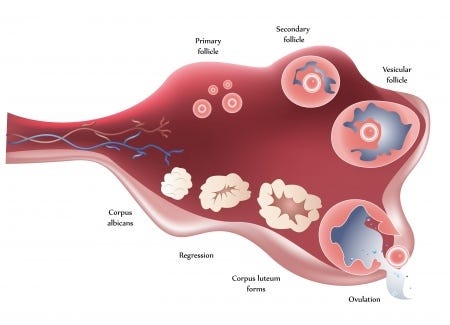Does Birth Control Reduce Fertility?
I recently sat down with a group of women to discuss what matters most: our health. One of the major concerns raised during our conversation was about oral contraceptive use and the worry that it may affect future fertility.
Could altering our hormones in order to suppress the ovulation cycle and lessen uterine lining cause infertility risk in the future?
This is a really important question, and luckily there have been several studies on the topic to address our fears.

Different birth control pill packs. Photo: Shutterstock
Worries that oral contraceptives may cause decreased fertility were raised in early reports in the 1970’s and 80’s. At that time, oral contraceptives used high-dose hormones. Later studies, performed in the 90’s and on, when the majority of women were using low-dosage estrogen pills, disproved those concerns.
These studies, conducted over the past 3 decades, looked specifically at the effects of different forms of contraceptives on subsequent pregnancies.
First important fact to know: it takes the body about 3 months to completely clear of contraceptive hormones.
Results of these studies showed that irrelevant to how long the contraceptive is used, there is only an initial (temporary) delay in conception for the first 3 months after discontinuation, with no subsequent delay to conception. This initial delay coincides with the amount of time it takes the body to clear the contraceptive hormones.
Additional comprehensive reviews of available literature were conducted in 2011 and 2018, examining previous studies encompassing tens of thousands of women. The reviews showed that typical 1-year pregnancy rates, after stopping contraceptives, were between 79% and 96%. And pregnancy rates were the same across users of different types of birth control, including: oral contraceptives, contraceptive implants, monthly injections, copper IUDs, or hormonal IUDs. Furthermore, these pregnancy rates didn’t differ from those who had been using barrier methods or not using any contraceptives.
Some background on fertility:

Illustration of typical ovulation cycle. Illustration: Shuttershock
At birth, a woman starts with a fixed number of follicles. With each ovulation, a few follicles are used. Age-related miscarriages tend to occur as a result of abnormal chromosomes in the few follicles left. It seems that oral contraceptives protect against age-related miscarriages by suppressing ovulation and leaving more follicles available for when the woman stops using the contraceptives. In addition, oral contraceptives have not only been shown to reduce miscarriages, but have also been proven to increase fertility in animal models.
So why does it seem like women who use oral contraceptives for a long time have a harder time getting pregnant when they start trying?
Well, age is the main factor. Women who try for pregnancy later in life tend to need more time and support. Female fertility declines after age 30, slowly at first but rapidly after age 40. Age is considered to be the main factor in infertility NOT contraceptive use.
And it’s not just the women’s age that matters. Someone finally took on trying to figure out if a man’s age impacts fertility. It’s a tricky thing to study, since male aging parallels their partner’s age, and it took some fancy statistics work.
The study adjusted for other variables associated with male aging, such as cohabitation, smoking, alcohol use, BMI, and partner’s oral contraceptive use. After adjusting for maternal age and other factors, they were able to determine that conception takes longer when the male partner is older.
Chances that conception will take upwards of 12 months doubles from 8% when the man is 25 years old to 15% when he is 35 years old.
Other factors affecting infertility include smoking in men and women, extremes in body size, lack of or excessive physical exercise, alcohol and certain recreational drugs, occupational pollutants, and stress. All these factors need to be taken into account in assessing the impact of contraceptive usage.
Your fertility doesn’t seem to be affected by type of contraception/hormone, mode of use (cyclical or continuous hormone), or duration of use.

Different types of hormonal birth control. Illustration: goodrx.com
Interestingly, some studies have actually found increased fertility related to prolonged usage of oral contraception, particularly for 5 years or more.
Let’s unpack this and take a look at possible explanations for this phenomena.
Evidence from an Australian study indicated that long-term oral contraceptive use was associated with a reduced risk of age-related miscarriages.
The number of years of contraceptive pill use was correlated with pregnancy outcome. Lowered rates of miscarriages were found with increased years of pill use. This positive effect was only significant in women older than 30.
In researching for this article, I am reminded that we have come a long way in our understanding of women’s bodies and in the development and use of the Pill.
The birth control pill(s) that we use today are significantly different that the Pill of our mother’s generation though biases and concerns from the Pill’s early days still remain.
***
Dr. Uma Lerner is a practicing Psychiatrist based in San Francisco. Dr. Lerner utilizes a combination of cognitive-behavioral, mindfulness, and psychodynamic techniques in addition to medication management and specializes in depression, anxiety, bipolar disorder, ADHD, life transitions, grief, and loss. Dr. Lerner is an Assistant Clinical Professor of Psychiatry at the University of California, San Francisco Medical School, where she teaches and supervises medical students and psychiatry residents.
She has expertise in managing psychiatric and emotional challenges during pregnancy and while breastfeeding. You can learn more about Dr. Lerner’s practice here.
*No information on this post should be relied upon to make a medical diagnosis, or determine treatment for a medical condition. The information on this website is not intended to replace a one-on-one relationship with a qualified health care professional and is not intended as medical advice. Though I am a physician, my blog posts are for information purposes only and shouldn’t be seen as medical advice. Different people react to hormones differently, and it is important to be clinically evaluated and talk about your specific situation with your doctor.
***
References
Mansour D, Gemzell-Danielsson K, Inki P, Jensen JT. Fertility after discontinuation of contraception: a comprehensive review of the literature. Contraception, 84:5, 465–477, 2011.
Girum T, Wasie A. Return of fertility after discontinuation of contraception: a systematic review and meta-analysis. Contraception and Reproductive Medicine, 3:9, 2018. https://doi.org/10.1186/s40834-018-0064-y
Farrow A, Hull MGR, Northstone K, Taylor H, Ford WCL, Golding J. Prolonged use of oral contraception before a planned pregnancy is associated with a decreased risk of delayed conception. Human Reproduction, 17:10, 2754–2761, 2002.
Ford WCL, North K, Taylor H, Farrow A, Hull MGR, Golding J, ALSPAC Study Team. Increasing paternal age is associated with delayed conception in a large population of fertile couples: evidence for declining fecundity in older men. Human Reproduction, 15:8, 1703–1708, 2000.
Tabernero-Rico PM, Garcia-Velasco JA. Observational Study of the Social Determinants of Health in Subfertile versus Nonsubfertile Women. J Hum Reprod Sci, 12:3, 240–246, 2019. doi:10.4103/jhrs.JHRS_20_19
Rehman R, Zahid N, Amjad S, Baig M, Gazzaz ZJ. Relationship Between Smoking Habit and Sperm Parameters Among Patients Attending an Infertility Clinic. Front Physiol, 10:1356, 2019. doi:10.3389/fphys.2019.01356
Davis AR, Kroll R, Soltes B, Zhang N, Grubb GS, Constantine GD. Occurrence of menses or pregnancy after cessation of a continuous oral contraceptive. Fertility and Sterility, 89:5, May 2008.
Barnhart K, Mirkin S, Grubb G, Constantine G. Return to fertility after cessation of a continuous oral contraceptive. Fertility and Sterility, 91:5, May 2009.
Ford JH, MacCormac L. Pregnancy and lifestyle study: the long-term use of the contraceptive pill and the risk of age-related miscarriage. Human Reproduction, 10:6, 1397–1402, June 1995.
Isono W, Wada-Hiraike O, Kawamura Y, Fujii T, Osuga Y, Kurihara H. Administration of Oral Contraceptives Could Alleviate Age-Related Fertility Decline Possibly by Preventing Ovarian Damage in a Mouse Model. Reproductive Sciences, 25:9, 1413–1423, 2018. https://doi.org/10.1177/1933719117746758
